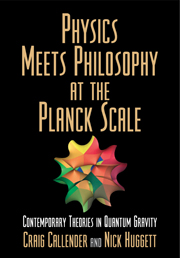Book contents
- Frontmatter
- Contents
- Preface
- 1 Introduction
- Part I Theories of Quantum Gravity and their Philosophical Dimensions
- Part II Strings
- Part III Topological Quantum Field Theory
- Part IV Quantum Gravity and the Interpretation of General Relativity
- 9 On general covariance and best matching
- 10 Pre-Socratic quantum gravity
- 11 The origin of the spacetime metric: Bell's ‘Lorentzian pedagogy’ and its significance in general relativity
- Part V Quantum Gravity and the Interpretation of Quantum Mechanics
- References
- Notes on contributors
- Index
9 - On general covariance and best matching
Published online by Cambridge University Press: 15 December 2009
- Frontmatter
- Contents
- Preface
- 1 Introduction
- Part I Theories of Quantum Gravity and their Philosophical Dimensions
- Part II Strings
- Part III Topological Quantum Field Theory
- Part IV Quantum Gravity and the Interpretation of General Relativity
- 9 On general covariance and best matching
- 10 Pre-Socratic quantum gravity
- 11 The origin of the spacetime metric: Bell's ‘Lorentzian pedagogy’ and its significance in general relativity
- Part V Quantum Gravity and the Interpretation of Quantum Mechanics
- References
- Notes on contributors
- Index
Summary
Introduction
This chapter addresses issues raised by Christian (Chapter 14), Penrose (Chapter 13), and others in this volume: What is the physical significance, if any, of general covariance? Norton (1993) has given a valuable historical survey of the tangled history of this question. His subtitle ‘Eight decades of dispute’ is very apt! Many people attribute the difficulties inherent in the quantization of gravity to the general covariance of Einstein's general theory of relativity, so clarification of its true nature is important.
Christian gives a clear account of what may be called the current orthodoxy with regard to the status of general covariance, and I disagree with little of what he says. However, in my view that merely draws attention to a problem – it does not say how the problem is overcome. I believe general relativity does resolve the problem, but that this has escaped notice. If this view is correct – and most of this chapter will be devoted to arguing that it is – then I believe it has important implications for the problem that Penrose is trying to solve in Chapter 13. I think he is trying to solve a problem that has already been solved. Nevertheless, I do feel all attempts to construct viable models of physical collapse are valuable, since they constitute one of the few alternatives to many-worlds interpretations of quantum mechanics.
- Type
- Chapter
- Information
- Physics Meets Philosophy at the Planck ScaleContemporary Theories in Quantum Gravity, pp. 199 - 212Publisher: Cambridge University PressPrint publication year: 2001
- 6
- Cited by



